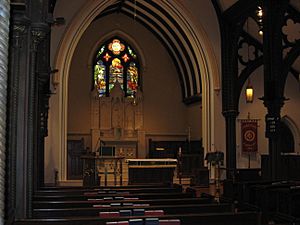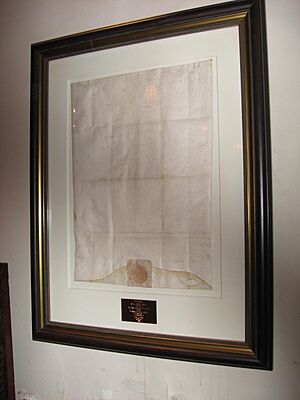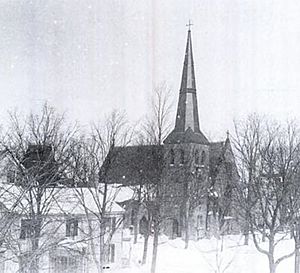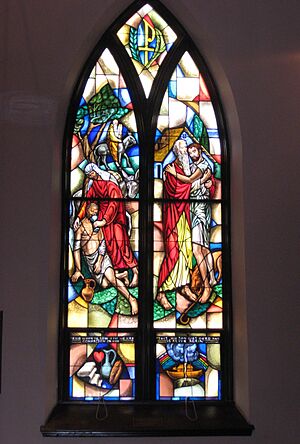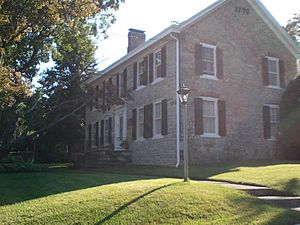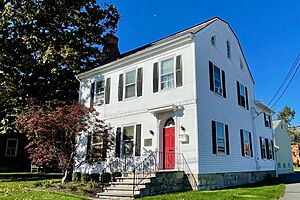Christ Church, Newton facts for kids
Quick facts for kids Christ Church |
|
|---|---|
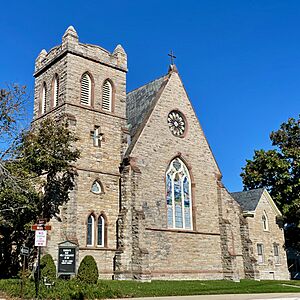
Christ Church in 2021
|
|
| 41°03′25″N 74°45′14″W / 41.0570582°N 74.7539363°W | |
| Location | 62–66 Main Street, Newton, New Jersey |
| Country | United States |
| Denomination | Episcopalian |
| History | |
| Founded | 28 December 1769 |
| Consecrated | 20 October 1869 |
| Architecture | |
| Architect(s) | Jonathan V. Nichols |
| Style | Gothic Revival (Broken Ashlar, Rustic Mode) |
| Years built | 1868–1869 |
| Groundbreaking | 21 August 1868 (cornerstone laid) |
| Specifications | |
| Materials | Native blue limestone, Newark Sandstone trimmings |
| Administration | |
| Diocese | Episcopal Diocese of Newark |
Christ Church, also called Christ Episcopal Church, is a Christian church building in Newton, New Jersey. It's located at the corner of Church Street and Main Street. This church is part of the Episcopal Church in the United States of America.
The church group first met on December 28, 1769. They received an official paper, called a charter, from New Jersey's last Royal Governor, William Franklin. He signed it for Britain's King George III. Christ Church is the oldest church in Newton. It is also the third oldest church group in the Diocese of Newark.
The building you see today was built between 1868 and 1869. It's the second church on this spot. It shows a style called Gothic Revival architecture, which looks like old English churches. Inside, the main area has many beautiful stained-glass windows. These windows show stories from the life of Jesus of Nazareth. They were made by J&R Lamb Studios.
On September 24, 1992, Christ Church in Newton was added to the New Jersey Register of Historic Places. This was part of the Newton Town Plot Historic District. It was also added to the National Register of Historic Places on November 12, 1992.
Contents
History of Christ Church
How the Church Started
In 1770, a church leader named Dr. Thomas B. Chandler visited Sussex County, New Jersey. He found about 50 families who belonged to the Church of England. These families often met in homes to read church prayers. No Anglican church leader had visited them before.
Many of these families met in Newton on December 28, 1769. They decided to start an Anglican church group. On August 15, 1774, Christ Church became officially recognized. Its full name was The Rector, Church Wardens, and Vestrymen of Christ's Church at New Town, in the county of Sussex and province of New Jersey.
New Jersey's last royal governor, William Franklin, signed the official charter. This was on behalf of Britain's King George III. The church group asked for help to get land. They were given a warrant for 200 acres of land in Sussex County. This land was meant to help support the church financially.
A local landowner, Jonathan Hampton, also gave land to the church. He did this on December 14, 1774. He wanted to help the Episcopal religion grow and support the church leader.
Early Years (1769–1869)
The church asked for a clergyman. In 1770, a missionary named Uzal Ogden was sent to the area. He became the church's leader, called a rector, in 1773. The church's first parsonage, or home for the rector, was built around 1770.
Ogden held services in Newton once a month. He also served other churches in a large area. Services were held in the County Court House, which was a good place for them. During the American Revolution, Ogden supported American independence. He even kept sheep in the parsonage basement for the Continental Army.
Ogden left Christ Church in 1784. For 36 years after he left, the church did not have a full-time rector. Services were held only sometimes. This was a difficult time for the church.
In 1820, the Rev'd Clarkson Dunn became the new rector. He also ran a school at the rectory starting in 1823. Dunn stayed until 1857, when his son-in-law, the Rev'd Nathaniel Pettit, took over.
The first church building was started in May 1823. It was officially opened a few months later on November 19, 1823. This building was also at the corner of Church and Main streets. It was a small Gothic-style building that could hold 250 people.
By the end of Pettit's time, the church needed a new building. The old one was becoming unsafe. While the new church was being built, the group met at the county courthouse and at Rinker's Hall.
The Current Church (1869–Present)
The church group grew a lot, so they needed a bigger building. To pay for it, they sold some land they owned in 1868. They also sold their old parsonage.
A church member named Robert Hamilton helped with a loan for the building. Hamilton was an important political figure. He served in the New Jersey government and later in the U.S. House of Representatives. After Hamilton passed away in 1878, his wife, Sarah, said the church didn't have to pay back the loan. This meant the church had no debt after building the new church.
The new church building was designed by architect Jonathan V. Nichols. It cost $23,000 to build. The first service in the new building was held on July 11, 1869. The building was officially opened on October 20, 1869.
Today, the church has a three-story bell tower. It used to have a very tall spire, 108 feet high, with a 12-foot cross on top. But this spire was removed after lightning struck it three times.
A new rectory was built in 1868–1869. It was used as the rector's home for 30 years. Later, it was used for church activities. In 1901, the church bought a new rectory on Liberty Street. Holley Hall, a building for church activities, was built in 1965. It was funded by a gift from Alice Herbert Holley.
Church Design and Art
Christ Church in Newton is part of the Newton Town Plot Historic District. This district was added to the New Jersey Register of Historic Places and the National Register of Historic Places in 1992. The historic district covers 17.2 acres and includes 56 important buildings.
The current church building was designed by architect Jonathan V. Nichols. It was built from 1868 to 1869. It is an example of Gothic Revival architecture, which looks like medieval English churches. The building was made from local blue limestone and trimmed with sandstone. The roof is made of black slate from Newton.
The church property also includes a Gothic Revival style rectory built in 1868. There is also an old house from the 1700s, called the Thomas Anderson House. This house belonged to Colonel Thomas Anderson, who helped the American Army during the Revolution. He was also one of the first leaders of Christ Church. His home was moved next to the church in 1896. In 1965, Christ Church bought it, and it is now the church office.
When the church was finished in 1869, it could hold 400 people. It had a special window above the altar. Today, there is a beautiful Tiffany-style window above the altar, added in 1919. The main part of the church has many colorful stained-glass windows. These windows, added in 1968, show scenes from the life of Jesus of Nazareth. They were made by J&R Lamb Studios, an old art company in the United States. The windows show scenes like:
- The Annunciation (when an angel told Mary she would have Jesus)
- The Nativity of Jesus (Jesus' birth)
- The Holy Family's flight into Egypt
- Christ as a boy in the Temple
- The Baptism of Jesus
- The Temptation of Christ in the desert
- The calling of the disciples
- The marriage at Cana
- Christ's blessing of the Children
- The Entry into Jerusalem on Palm Sunday
- The Last Supper
- Jesus in prayer in the Garden of Gethsemane
- Different stories (parables) from the Gospels
- Scenes of Christ's crucifixion, resurrection, and ascension.
Church Leaders (Rectors)
Eighteen clergymen have served as the main leader, or rector, of Christ Church in Newton. The first was Uzal Ogden, Jr. He started serving in northwestern New Jersey in 1770. He also served other churches in a very large area. Because there was no bishop in America at that time, Ogden traveled to England to become a priest.
After Ogden left in 1784, the church did not have a full-time rector until 1823. During this time, a few other clergymen helped out sometimes. This included the Reverend John Croes, who later became the first Bishop of New Jersey.
The second rector, Clarkson Dunn, served both Christ Church and another church in Knowlton. Dunn passed away in 1870. The town of Newton honored him by naming two streets, Clarkson Street and Dunn Place, near the old parsonage.
After ten years, Dunn's son-in-law, Nathaniel Pettit, left his role in 1867. He became Sussex County's first Superintendent of Schools. Another rector, Moffett, served for fifteen years. He then left to become the American minister (like an ambassador) to Greece in 1885.
The current rector is Robert T. Griner. He studied at Drew University and the University of Oxford. He also earned a Master of Divinity degree from Yale University.
| # | Rector | Term began | Term ended |
|---|---|---|---|
| 1 | The Rev'd Uzal Ogden, Jr. (1744–1822) | 1770 (1773) | 1784 |
| – | Vacant | 1784 | 1820 |
| 2 | The Rev'd Clarkson Dunn (1794–1870) | 1820 (1823) | 1857 |
| 3 | The Rev'd Nathaniel Pettit (1825–1885) | 1857 | 1867 |
| 4 | The Rev'd William Welles Holley (1841–1916) | 1868 | 1870 |
| 5 | The Rev'd William Henry Moffett (1834–1890) | 1870 | 1885 |
| 6 | The Rev'd Samuel Edson (1844–1898) | 1885 | 1892 |
| 7 | The Rev'd Charles Leighton Steele, Sr. (1863–1938) | 1892 | 1910 |
| 8 | The Rev'd James E. Hall (1844–1913) (acting) | 1910 | 1911 |
| 9 | The Rev'd Ernest G. Tuthill | 1911 | 1915 |
| 10 | The Rev'd George A. Green | 1915 | 1919 |
| 11 | The Rev'd Gilbert Lee Pennock | 1919 | 1923 |
| 12 | The Rev'd George Hewlett | 1923 | 1927 |
| 13 | The Rev'd Oscar Meyer | 1928 | 1934 |
| 14 | The Rev'd George Hewlett | 1934 | 1947 |
| 15 | The Rev'd Leonard F. Nichols | 1947 | 1963 |
| 16 | The Rev'd William L. Dougherty | 1963 | 1981 |
| 17 | The Rev'd Joseph D. Herring | 1983 | 1998 |
| 18 | The Rev'd Bradford G. Whitaker | 1998 | 2002 |
| 19 | The Rev'd Robert T. Griner | 2003 | present |
See also
- First Presbyterian Church (Newton, New Jersey)
- National Register of Historic Places listings in Sussex County, New Jersey
- Newton Cemetery (Newton, New Jersey)
- Episcopal Diocese of Newark
 | Chris Smalls |
 | Fred Hampton |
 | Ralph Abernathy |


